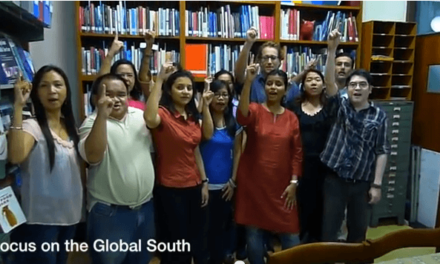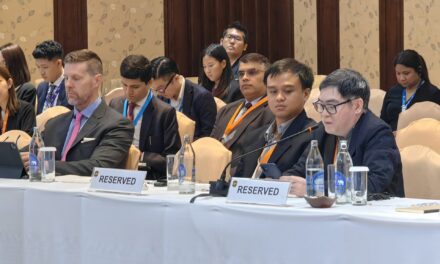By Herbert V Docena
HYDERABAD, INDIA – Miyoko Matsubara’s breaking voice blared through the public address speakers. It has been a long journey from Hiroshima to Hyderabad. At 70, Miyoko has come a long way from 1944 when the bomb was dropped and she was among the few who survived. Now her voice, wavering still after countless times of retelling, rose above the dust over Nizam College grounds where the first Asian Social Forum was camped. She was crying again.
It was just the first day of the week-long forum. Elsewhere in the city, other people’s voices were breaking. Deena Farhab from Afghanistan was close to tears as she recounted how the Taliban, the US’ mercenaries during the Afghan war with the Soviet Union, took away, tortured, and brutally killed her husband. From Rajasthan, Murari talked about how four of his family members died from starvation.
Others’ voices had been hardened. Abdel Jawad Saleh from Palestine angrily denounced the Israeli state’s ill-disguised genocide of his people. Others spoke for those who could no longer be heard: Jeong Soo Kim of South Korea demanded, on behalf of the two teenagers who had been crushed to death by US tanks, for the immediate expulsion of US bases in Seoul.
Others didn’t even have to speak. Nora de Cortinas, one of the founders of the Madres de Plaza de Mayo, an organization of the mothers of those who had been abducted and killed by the dictatorial regimes installed by the United States in Latin America in the 70s, said it all with a scarf she wore around her head. It was embroidered with her son’s name.
It was not just another conference. Over 14,000 Indians and 700 other people from all over the continent, belonging to around 800 organizations and movements, had gathered in Hyderabad, a city known throughout India as the place where farmers and weavers had been pushed beyond the verge and had taken their own lives out of poverty and despair. It was the Asian leg of the World Social Forum, or what has been gradually emerging as the organizational embodiment of a massive global counter-movement against the kind of forces that bind people like Miyoko, Deena, Abdel, Jeong, and Nora. Its slogan is short, its aim grand: “Another world is possible.”
For six days, the dusty grounds of Nizam College was turned to one big counseling room. The forum had become a thousand-person therapy session – an Alcoholics Anonymous-like meeting for Asia’s dispossessed. Eight major conferences, 160 seminars, and 164 workshops gave people more than enough outlets for pouring their hearts out to people who, to paraphrase a line from a movie, were there to really listen and not just wait for their turn to speak.
From Bangladesh to Burma, from Tibet to Thailand, intellectuals, activists, workers, farmers, rickshaw drivers, artists all came together to share their woes from as wide a range of problems as structural adjustment, ecological destruction, foreign interventions, authoritarian repression, gender violence, caste discrimination, fundamentalist exclusion…
People need to know that they’re not alone. Before they can even imagine a future, before they can even start debating on the alternatives, people need to feel connected. In addressing this basic instinctive need lies the potency – and the necessity – of holding gatherings like the ASF. By giving people a venue where they can all figuratively weep together and console each other, the Porto Alegre process assures people that their suffering is not isolated.
In one conference on caste discrimination and globalization, dalits, or people who are considered “untouchables” in the Hindu caste system, shared the stage with the Burakus, a people considered “impure” by Japanese society. The dalits have probably never heard of the Burakus and the Burakus probably do not know about dalits. But it surely could not have escaped them how so strikingly familiar and recognizable the other’s stories were.
You could almost see the Buraku’s eyes widen when she heard that in Nepal, the dalits have been doing nothing else but wash the dishes and clean the toilets for the upper castes. They are not even allowed to sell water. How different is that from the Burakus’ situation back home where the only work they’re allowed to do is to wash the skin of dead animals and turn them to leather? You could almost see the dalits linking arms with the Buraku when they both heard how both of their governments’ are increasingly lifting welfare assistance to them as part of austerity measures and structural adjustment policies.
By convincing people that there are others out there who have also went through what they are going through, the Porto Alegre process can prevent people from retreating into their own little corners in the world, obsessing about their own parochial concerns, or giving up altogether because they feel they’re too little and there’s no way they can possibly put up a fight. And there, in their isolated remote corners of withdrawal, they begin to doubt whether their sufferings are in fact real, whether they’re not just exaggerating them, whether it’s really as bad as it seems.
But then they come to Hyderabad. And there, seeing and hearing real people grieving, they remember that the pangs of hunger was real, the stigma of society’s contempt was real,
the unbearable weight on their chests when they lost their son was real. For by giving people a real physical space where they can share their experiences, abstract concepts like “oppression” became real. Previously empty slogans like “American imperialism” became loaded with meaning. Remote and impersonal institutions like the World Trade Organization or the International Monetary Fund became less distant.
Miyoko gave a voice to the horror of nuclear annihilation and to America’s continuing disregard for the plight of innocent civilians caught in its wars of aggression. The embroidery on Nora’s scarf gave a name to the continuing connivance between Washington and repressive ruling regimes. Deena gave a face to the US’ complicity in the rise of Islamic fundamentalism.
In the end, it is the sharing of grief — and hope — that makes events like the Asian Social Forum different. The world’s CEOs can share their surefire marketing strategies in their posh convention centers and five-star hotels. ‘Neutral’ academics can exchange their latest findings in conferences in their secluded universities. The world’s political and business elites can have their Davos or Genoa. They can have their caches of cash and their arsenal of bombs. But Asia’s dispossessed – they will have their Hyderabad and they will have each other.
For somehow, it is pain that keeps us united. Participants in the ASF may have carried a variety of passports, looked very different from each other, and espoused clashing ideological orientations and strategies. But is hunger from Pakistan different from the hunger felt in Palestine? Is the loss of a child less painful to a Maoist than to a Trotskyist? Are reformists less terrified of bombs than abolitionists?
In the end, it may yet be this purging of sorrow that will lead to the forging of that other world which is possible and – because the present one’s share of misery has become unbearable and unacceptable – urgently necessary. For some, pain is a precondition for optimism: you cannot hope for something better unless you don’t know how much worse it has actually been. In this sense, the ASF may well have been cathartic. Pain can lead to surrender, despair, and paralysis. But, through processes like the WSF, it can also be transformed to hope and translated to action.
Towards the end of her speech, the breaking voice of Miyoko – 70 years old, scarred but still fighting – became unwavering. On the final afternoon of the forum, thousands of delegates filed out of Nizam College, took to the streets, and gave expression to the abstract word “solidarity.”
A group of psychologists have recently announced that ironically, the more you protest, the happier you become. The march was proof: what had at times become a forum of depressing testimonials culminated with a joyous and festive parade. There was frenzied dancing and rousing chanting. Grief had turned to euphoria. For those who had previously felt forlorn and isolated, no sight could have been more comforting than that throbbing mass – burdened but beaming, and still marching on determinedly to another world that is possible.
* Herbert V. Docena is a research associate with Focus on the Global South


![[Cambodia] Occupational Health and Safety for Construction Workers and Safe Building Standards Must Be Guaranteed](https://focusweb.org/wp-content/uploads/2019/07/Cambodia-Building-Collapse-440x264.jpg)






